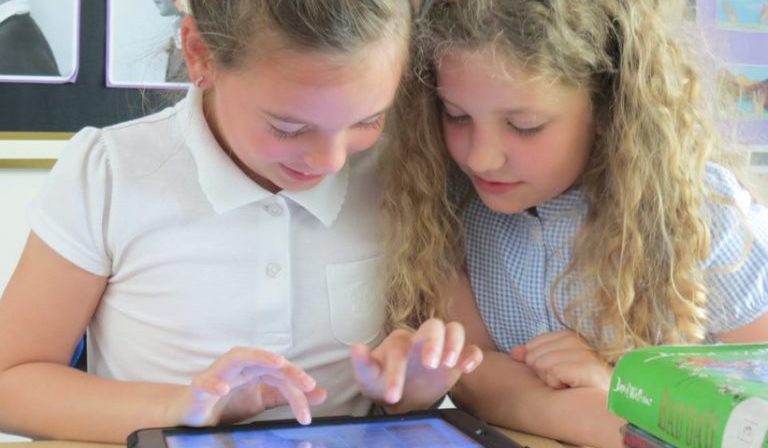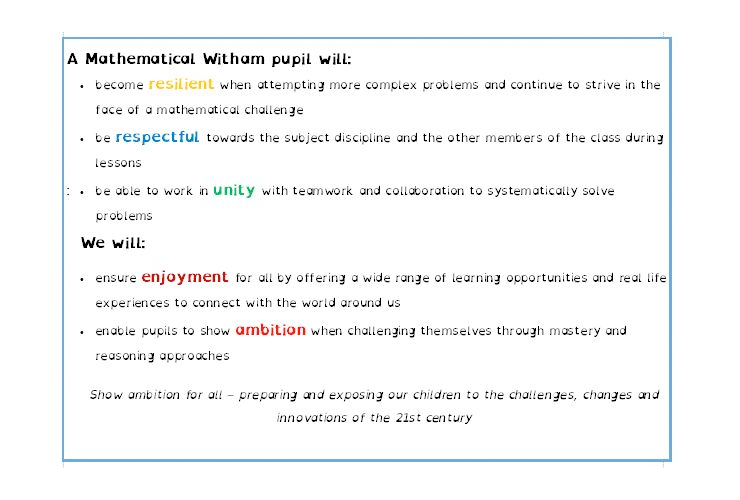
Learning mathematics as Witham St Hughs Academy is an ambitious and exciting experience in which pupils thrive. Daily maths lessons, engage all pupils into the world of number, place value, calculation, fractions, measure, shape, data handling and algebra. We believe mathematics should be taught in separate disciplines, and this approach provides all pupils the powerful knowledge they require to access subsequent learning and engage within society. During their time at Witham St Hughs Academy, pupils will experience a wide range of concrete, pictorial and abstract opportunities that develop systematic thinking and deeper reasoning skills.
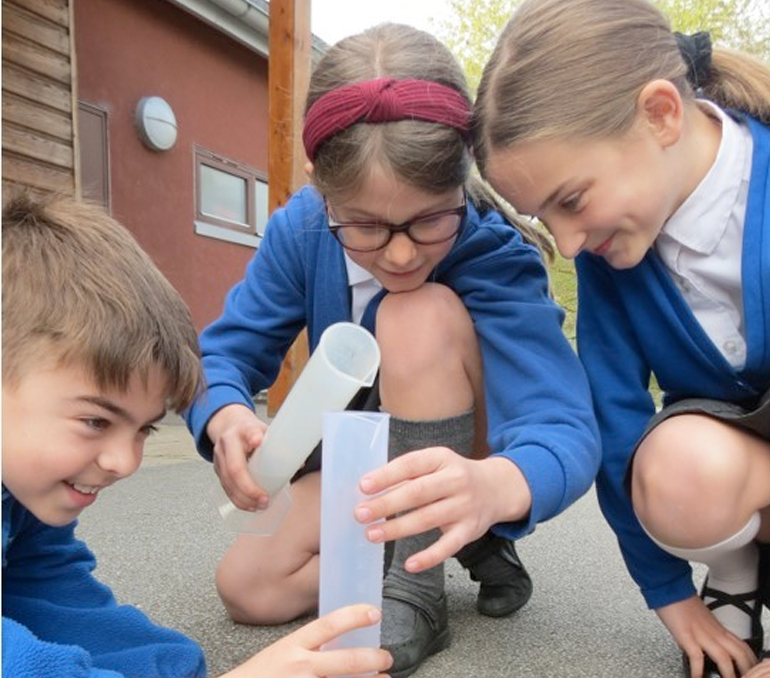
We believe that all pupils are entitled to become fluent in the fundamentals of mathematics. They should have both fluencies of recall and conceptual understanding of the problems they solve. We believe that all pupils should have the opportunity to reason mathematically, use mathematical language and understand the purpose and application of mathematics.
Our curriculum is rooted in the National Curriculum requirements for mathematics and it is coherently planned and sequenced with a clear end point for each year group. The planning follows a spiral model to ensure regular recap and revision of the separate mathematical disciplines, and to help pupils remember in the long term. Spaced learning is used and evident in medium term planning to maximise pupil retention of mathematical facts and concepts in order that these are applied with fluency when tackling reasoning problems.
Our year group coverage of maths topics are mapped out through the year so that a spiral curriculum is achieved: this allows pupils to review and revisit topics (such as place value and geometry) to consolidate understanding.
We ensure our planning covers fluency, problem solving and mastery approaches to maths. This results in ambitious mathematicians who, as they progress through the Academy, have the skills to respond to a range of mathematics challenges and questions. We believe that at the end of each key stage at Witham St Hughs Academy, pupils should have developed detailed knowledge and skills across the mathematics curriculum and are ready for their next stage of mathematics education in KS3 and beyond.
Our mathematics curriculum is taught to reflect the knowledge that pupils need daily in the ever-changing world around us. We use real life experiences and process that support all pupils to progress effectively. We focus on a concrete, pictorial, abstract approach that allows a deeper understanding of number.
At Witham St Hughs Academy, we believe the best pedagogy for teaching mathematics is our ‘stations’ approach. We firmly believe that this highly differentiated approach allows all pupils access to the powerful knowledge within mathematics, does not hold back any group of learners and provides the flexibility in planning for pupils to excel within one discipline yet access support within another. Mathematics is taught daily at the Academy: each week the pupils are exposed to opportunities to revisit core arithmetic skills and fraction questions, alongside their current learning topic.
Spaced learning is central to our pedagogical approach to mathematics. Therefore, each mathematics lesson starts with a mental starter using the ‘Active Number’ approach that the school have developed. This approach gives pupils the ability to perform mathematical calculations with speed, having daily times table, recall and quick-fire question experience to support essential mental maths subject knowledge. Teachers check regularly whether previously taught concepts have been remembered with well-structured lessons which prioritise recap and address any misconceptions pupils may have. Additional or individual support for pupils is accessed in quality first teaching and during small group work or interventions.
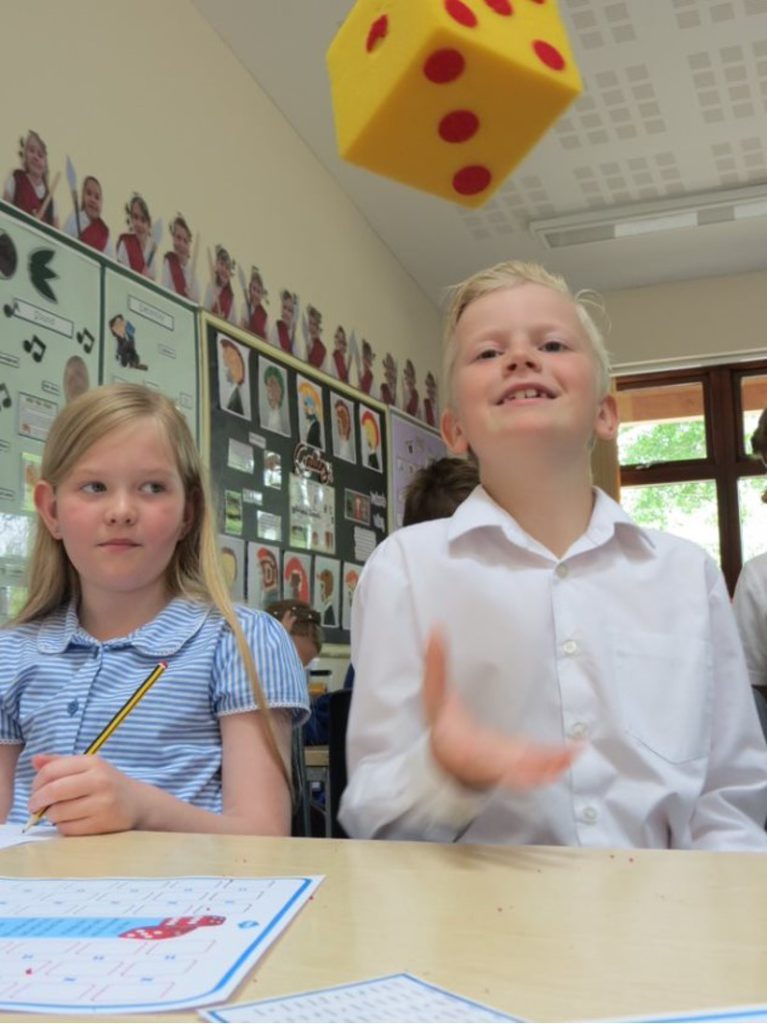
Mathematical experiences are event throughout the Academy within practical classroom lessons and further outward reaching experiences with the wider Academy and village community. Alongside the daily concrete, pictorial, abstract experiences and fluency lessons, pupils are involved in practical, real experiences during mathematic topics.
In Year 1, the pupils use real coins in their role play area to embed their recognition when ‘buying’ items. Building on this, the use of cross-curricular experiences, involves Year 2 pupils visiting the local co-op to buy the ingredients for their cooking lesson: planning and budgeting for the items that they need then going to buy the ingredients. The teaching team compliment these experiences with mastery style questions and problems to solve along the way. Cross curricular links are made where these are both possible and powerful.
In key stage 2, the pupils access the wide range of measure resources in the Academy to estimate, measure and compare capacity, length and mass. They use food packaging to read and recognise the different units of measure. This develops into design and technology (food) lessons, in Year 5, where the pupils design, plan, budget, buy and make food items to sell to the wider community. This includes the interval of the summer productions and summer fair experiences to name a few.
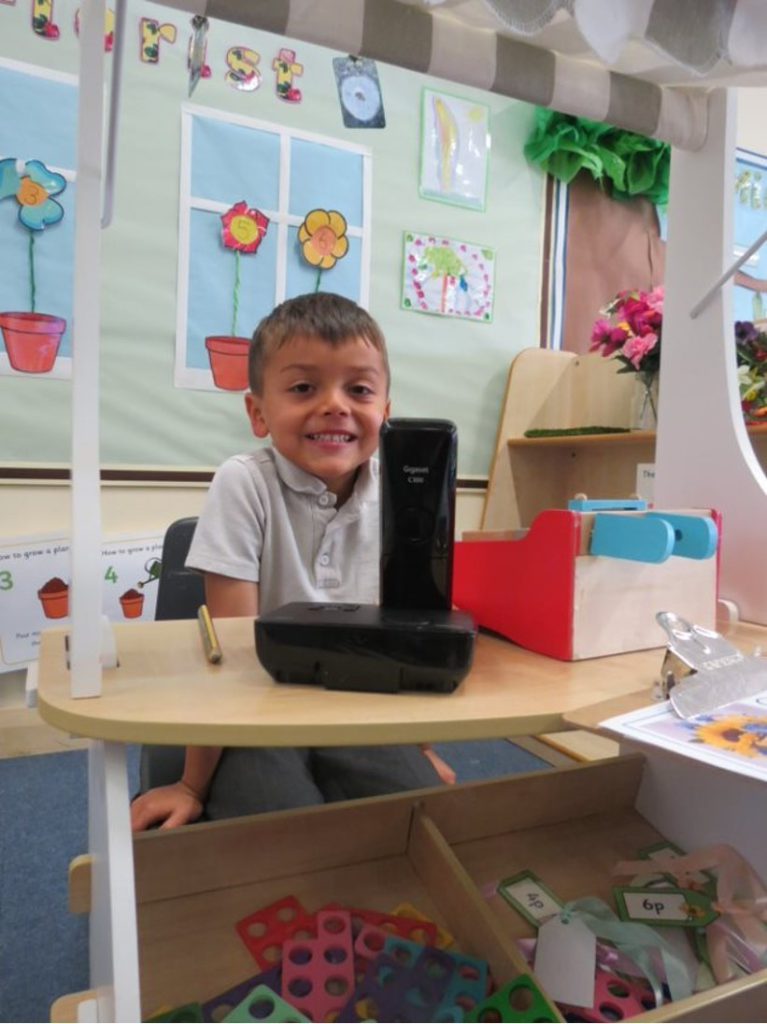
In every classroom! All classrooms in the Academy use a consistent display approach in maths. This includes the titles of current learning, the previous topic learned, supporting recall and review skills, and a fraction area. These three areas are adapted and updated frequently to ensure that the display is used on a daily basis: to support language for maths, calculation skills and engaging pupils in their mathematics learning. Teachers ensure the content of the display demonstrates the planning and National Curriculum outcomes for the year group.
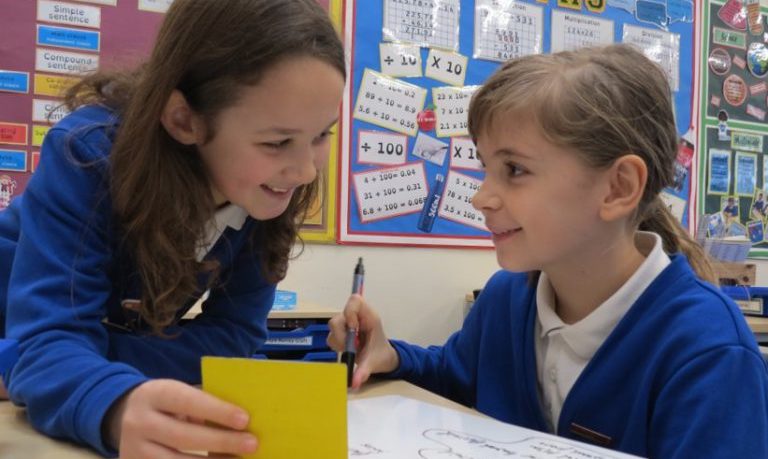
We know that mathematics is the core of daily life and we ensure that powerful real life experiences enhance our ingenious curriculum. Our subject leader seeks to work beyond the classroom and allow opportunities to work with the local community and wider. We engage in maths challenges with schools nearby and the wider Trust.
This year, the whole school engaged in a Trust wide SumDog competition on iPads, involving pupils answering a range of mathematics questions. During the competition, pupils could work from home or school to complete one thousand questions accurately. Resulting in awards within school and externally for successes. In upper key stage 2, a group of pupils complete the ‘Primary Maths Challenge’ competing against children all over the country with excellent results. A small group of gifted and talented mathematicians attend a maths challenge day at Sir William Robertson, secondary school, to be involved in a range of problem solving, mathematical challenges.
